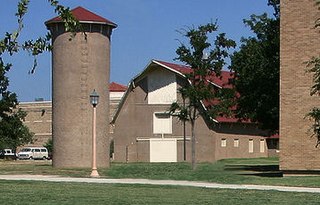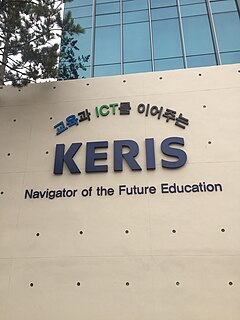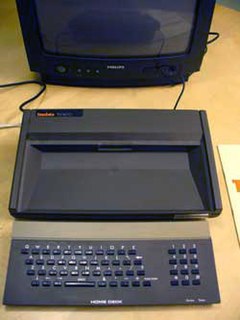Related Research Articles

Distance education, also known as distance learning, is the education of students who may not always be physically present at a school, or where the learner and the teacher are separated in both time and distance. Traditionally, this usually involved correspondence courses wherein the student corresponded with the school via mail. Distance education is a technology mediated modality and has evolved with the evolution of technologies such as video conferencing, TV, and internet. Today, it usually involves online education and the learning is usually mediated by some form of technology. A distance learning program can be completely distance learning, or a combination of distance learning and traditional classroom instruction. Other modalities include distance learning with complementary virtual environment or teaching in virtual environment (e-learning).
Continuing education is an all-encompassing term within a broad list of post-secondary learning activities and programs. The term is used mainly in the United States and Canada.
Lifelong learning is the "ongoing, voluntary, and self-motivated" pursuit of knowledge for either personal or professional reasons. It is important for an individual's competitiveness and employability, but also enhances social inclusion, active citizenship, and personal development.
Agricultural extension is the application of scientific research and new knowledge to agricultural practices through farmer education. The field of 'extension' now encompasses a wider range of communication and learning activities organized for rural people by educators from different disciplines, including agriculture, agricultural marketing, health, and business studies.

Open educational resources (OER) are teaching, learning, and research materials intentionally created and licensed to be free for the end user to own, share, and in most cases, modify. The term "OER" describes publicly accessible materials and resources for any user to use, re-mix, improve, and redistribute under some licenses. These are designed to reduce accessibility barriers by implementing best practices in teaching and to be adapted for local unique contexts.
A virtual university provides higher education programs through electronic media, typically the Internet. Some are bricks-and-mortar institutions that provide online learning as part of their extended university courses while others solely offer online courses. They are regarded as a form of distance education. The goal of virtual universities is to provide access to the part of the population who would not be able to attend a physical campus, for reasons such as distance—in which students live too far from a physical campus to attend regular classes; and the need for flexibility—some students need the flexibility to study at home whenever it is convenient for them to do so.

Agricultural education is the teaching of agriculture, natural resources, and land management. At higher levels, agricultural education is primarily undertaken to prepare students for employment in the agricultural sector. Classes taught in an agricultural education curriculum may include horticulture, land management, turf grass management, agricultural science, small animal care, machine and shop classes, health and nutrition, livestock management, and biology.

Student voice is the individual and collective perspective and actions of students within the context of learning and education. It is identified in schools as both a metaphorical practice and as a pragmatic concern. Tech educator Dennis Harper noted that student voice gives students "the ability to influence learning to include policies, programs, contexts and principles."

Universitas Terbuka is Indonesia's state university and employs open and distance learning (ODL) system to widen access to higher education to all Indonesian citizens, including those who live in remote islands throughout the country, as well as in various parts of the world. It has a total student body of 1,045,665 as of 2019/2020 according to Indonesia's Ministry of Education Higher Education database. According to a distance education institution in the UK, which published "The Top Ten Mega Universities", UT-3 ranks closely with universities from China and Turkey.
Community education, also known as community-based education or community learning & development, is an organization's programs to promote learning and social development work with individuals and groups in their communities using a range of formal and informal methods. A common defining feature is that programmes and activities are developed in dialogue with communities and participants. The purpose of community learning and development is to develop the capacity of individuals and groups of all ages through their actions, the capacity of communities, to improve their quality of life. Central to this is their ability to participate in democratic processes.
Frontier College is a Canadian literacy organization established in 1899 by Alfred Fitzpatrick. Founded as the Reading Camp Association, Frontier College aims to improve literacy levels in Canada by providing education to those who seek assistance with their learning and have been overlooked or left behind by the formal educational system. Frontier College runs a myriad of English-language and French-language literacy programs for children, youth and adults in many places across Canada such as community centres, shelters, farms and prisons. It was renamed Frontier College in 1919. Since 1986, its national headquarters has been located at Gzowski House at 35 Jackes Avenue in Toronto, Ontario.
In the history of virtual learning environments, the 1990s was a time of growth, primarily due to the advent of the affordable computer and of the Internet.

The National Extension College (NEC) was set up in 1963 as a not-for-profit organisation for distance learning for people of all ages. It was founded as a pilot study for the Open University.

KERIS is a governmental organization under the South Korean Ministry of Education, Science and Technology that develops, proposes, and advises on current and future government policies and initiatives regarding education in South Korea.

A virtual learning environment (VLE) is a system that creates an environment designed to facilitate teachers' management of educational courses for their students, especially a system using computer hardware and software, which involves distance learning. In North America, a virtual learning environment is often referred to as a "learning management system" (LMS).
Education in South Sudan is modelled after the educational system of the Republic of Sudan. Primary education consists of eight years, followed by four years of secondary education, and then four years of university instruction; the 8 + 4 + 4 system, in place since 1990. The primary language at all levels is English, as compared to the Republic of Sudan, where the language of instruction is Arabic. There is a severe shortage of English teachers and English-speaking teachers in the scientific and technical fields.
ISO/IEC JTC 1/SC 36 Information Technology for Learning, Education and Training is a standardization subcommittee (SC), which is part of the Joint Technical Committee ISO/IEC JTC 1 of the International Organization for Standardization (ISO) and the International Electrotechnical Commission (IEC), that develops and facilitates standards within the field of information technology (IT) for learning, education and training (LET). ISO/IEC JTC 1/SC 36 was established at the November 1999 ISO/IEC JTC 1 plenary in Seoul, Korea. The subcommittee held its first plenary meeting in March 2000 in London, United Kingdom. The international secretariat of ISO/IEC JTC 1/SC 36 is the Korean Agency for Technology and Standards (KATS), located in the Republic of Korea.
Educational inequalities in South Sudan can be attributed to a number of factors. The lack of funds and infrastructure, along with a poor and mostly illiterate population makes establishing an effective education system challenging. There are also certain traditional cultural ideas about women which make it more difficult for girls to get an education than their male counterparts.
Educational technology in sub-Saharan Africa refers to the promotion, development and use of information and communication technologies (ICT), m-learning, media, and other technological tools to improve aspects of education in sub-Saharan Africa. Since the 1960s, various information and communication technologies have aroused strong interest in sub-Saharan Africa as a way of increasing access to education, and enhancing its quality and fairness.
The Samuel Jackman Prescod Institute of Technology is a technical and vocational educational institution located in Pine Hill, Bridgetown, Barbados.